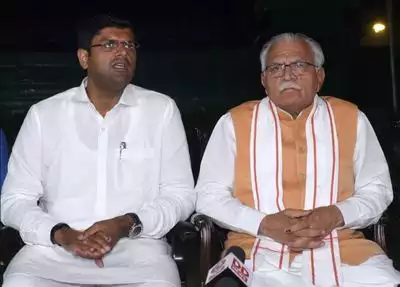The coalition between the Bharatiya Janata Party (BJP) and the Jannayak Janta Party (JJP) in Haryana is on the brink of collapse as both parties intensify efforts to solidify their respective support bases, which have historically been at odds. With the BJP severing ties with the JJP, a party largely backed by the agrarian Jat community, electoral dynamics in Haryana are once again revolving around the dichotomy of ‘Jats’ versus ‘non-Jats.’
The BJP’s decision to part ways with the JJP underscores its strategic focus on consolidating ‘non-Jat’ interests in the state. The alliance, formed solely to secure power in 2019, lacked ideological cohesion, with BJP leaders emphasizing its temporary nature. Moreover, the appointment of Nayab Singh Saini, an Other Backward Class (OBC) leader, as the new Chief Minister aims to appeal to the substantial OBC population, comprising around 40% of Haryana’s demographics.
By replacing long-standing Chief Minister Manohar Lal Khattar, the BJP aims to counter the looming ‘anti-incumbency factor’ ahead of the 2024 Lok Sabha and subsequent Assembly elections. Saini’s appointment, coupled with his influence in north Haryana districts, aims to bolster the BJP’s support among non-Jat communities.
Haryana’s political landscape remains influenced by the fallout from the 2016 violent protests for Jat quotas, highlighting the enduring rift between Jats and other communities. With 36 castes comprising the state’s social fabric, alliances often form along caste lines, with communities like Sainis, Banias, Brahmins, Yadavs, and Punjabis coalescing against Jat-centric parties.
The JJP, born out of the Indian National Lok Dal (INLD), emerged as the voice of the Jat community, aligning with the BJP post-2019 elections to gain power. However, with the alliance now crumbling, the BJP faces challenges in maintaining its electoral stronghold, particularly as the JJP retains significant influence in the state assembly.
As Haryana gears up for elections, the BJP’s abrupt maneuvers suggest underlying apprehensions about its electoral prospects. While post-poll alliances may serve short-term interests, the BJP must address ideological disparities to secure long-term electoral viability.






